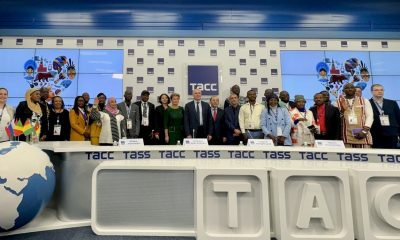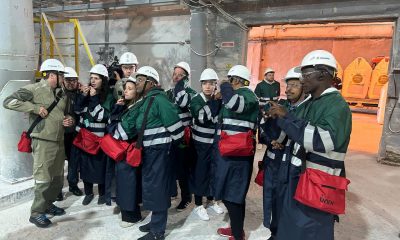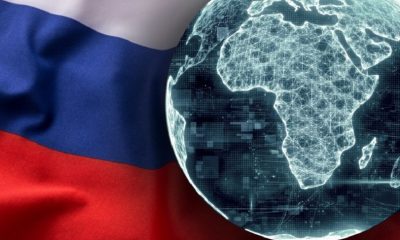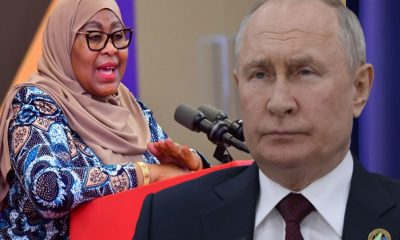Feature/OPED
Multilateral Collaboration Still Crucial For Tackling Africa’s Conflicts

By Professor Maurice Okoli
Burkina Faso, Mali and Niger have adopted an incredible approach towards tackling chronic conflicts and related security threats from various extremist groups like Boko Haram, al-Qaida, and Islamic State-affiliated groups by creating a formidable military alliance in the semi-arid Sahel region in West Africa.
As these West African States are entangled in fierce ethnic-Islamic conflicts that have adversely impacted their sustainable development and economic progress, the trio-military force reflects more proactive and dynamic coordination in resolving their security hurdles. It would also enhance practical possibilities of combating terrorism and extremism in the interests of strengthening peace and security in the Sahel-Sahara region and other parts of West Africa.
Historically the three were closely under French political control and have extended economic and security ties since colonial times. This geographically landlocked Burkina Faso has had several military coup d’états, the latest took place in Jan. 2022. Mali (May 24, 2021) and Niger (July 26, 2023) witnessed similar political trends, and both are now under military administration and share startling critical accusations of corruption and malfunctioning of state governance against previous governments. But the finger-end points to France for gross under-development and large-scale exploitation.
These former French colonies have, for the past years, suffered from growing political deficiencies and frequent Islamic attacks. But the key reason, the underlying cause, those tribes are rebelling is due to deep-seated abject poverty across the region. Staging military takeovers was the trio’s dynamic struggle to wage a collective war against their governments and France’s influence and hegemony. For instance, France, the United States and other European nations have poured hundreds of millions of dollars into shoring up Niger’s army and the coup has been seen as a major setback. Overall security environment poses uncertain challenges and devises strategies to tackle these emerging threats in the region.
Existing Sanctions
Since last year, Burkina Faso, Mali and Niger have been under regional and continental sanctions. The 15-member West African regional bloc has imposed stringent sanctions, finding a peaceful solution to the deepening crisis, but yielded little tangible results with no clarity on the next steps.
The African Union (AU), the continental organization which primarily coordinates the political and economic as well as the socio-cultural activities, observes the new trends as military rule spreads or re-appears in the West African region. That however, the Chairperson of the African Union Commission, Moussa Faki Mahamat, strongly condemned such actions and further moved to impose its sanctions as well on the military-ridden states. Their AU memberships, since then, have accordingly been suspended too.
Quite recently, on 28 November 2023, the United Nations Secretary-General António Guterres and the African Union Commission Chairperson Moussa Faki Mahamat convened their seventh African Union-United Nations Annual Conference in New York. In a joint communiqué issued at the end of the meeting, both reviewed progress in the implementation of the UN-AU Joint Framework for Enhanced Partnership in Peace and Security and the AU-UN Framework for the Implementation of Agenda 2063.
In particular, António Guterres and Moussa Mahamat again condemned the resurgence of unconstitutional changes of government in Africa and stressed the need for a timely and peaceful return to constitutional order in Burkina Faso, Gabon, Guinea, Mali, Niger and Sudan which are undergoing complex political transitions to sustain peace, development and human rights in the long term. There must be extensive political awareness among the people in the Sahel region to focus on democracy, development, security and stability. It also called for the release of President Bazoum and other arrested government officials.
Nevertheless, the Economic Community of West African States (ECOWAS) and the Intergovernmental Authority for Development (IGAD) were tasked to enhance their joint efforts to promote inclusive political transitions in those countries in support of the efforts of the respective transitional authorities and regional bodies. The meeting called for continued efforts towards the timely completion of all ongoing political transitions through peaceful, inclusive, transparent and credible elections.
Against this backdrop, they expressed concern over the challenges African countries continue to face towards the achievement of the AU Agenda 2063. Burkina Faso, Guinea, Mali and Niger, nevertheless have displayed defiance to the sanctions and, crafting a number of approaches and making their efforts toward addressing security and development-oriented issues combined with some kind of good governance.
Revisiting the Past
Within the context of the changing political situation, Russia is rapidly penetrating the Sahel. Moreover, to Russia’s expectations, these Sahelian States have in place provisional governments, which include civil society representatives. “We believe that a military approach to settling the crisis in Niger risks leading to a protracted standoff in the African country and a sharp destabilization of the situation in the Sahara-Sahelian region as a whole,” according to the statement posted to the Foreign Affairs Ministry’s website.
South African Institute of International Affairs reports established the fact that Russia seeks to build on Soviet-era ties, steadily widening its influence, and noticeably deploy the rhetoric of anti-colonialism in Africa. Russia is engaged in an asymmetric influence campaign in Africa. Borrowing from its Syria playbook, Moscow has followed a pattern of parachuting to prop up politically isolated leaders facing crises, often with abundant natural resources. Russia is fighting neo-colonialism from the West, especially in relations with the former colonies. According to the report, Russia sees France as a threat to its interests in Francophone West Africa, the Maghreb and the Sahel. The SAIIA is South Africa’s premier non-government research institute on international issues. (SAIIA, Nov. 2021 Report).
“Sanctions have already been announced against Niger, and its membership in the organization is likely to be suspended. Thus, a belt of states in political isolation and bordering on each other is forming in the Sahara-Sahelian region: Guinea – Mali – Burkina Faso – Niger. Russia is interested in expanding relations with Niger, as well as with all other African States, and thus could help to normalize the situation there,” Vsevolod Sviridov, Expert at the HSE University Center for African Studies, told Russia’s Financial Izvestia.
Russia’s Economic Interest
In pursuit of development, the five Sahel states need peace. An analysis of geopolitical factors underscores glaring facts that Russia is getting stronger with its military influence on a bilateral basis, bartering equipment in exchange for access to natural resources. Mali has an agreement with Russia to build a gold refinery while Burkina Faso also wanted energy power. A four-year memorandum guarantees the West African country’s largest gold refinery. Russia’s state nuclear energy company Rosatom signed a deal with Mali in October 2023 to explore minerals and produce nuclear energy. It unreservedly offered a high-level promise to build a 200- to 300-megawatt solar power plant by mid-2025.
Economic Performance
International Monetary Fund (IMF) and the World Bank research reports show that Sahelian states’ economy may face relative stagnation due to unstable conditions including persistent protests in the region. Burkina Faso, Chad, Mali and Niger have been severely affected by the rise in militancy, affecting overall economic performance. Agriculture represents 32% of its gross domestic product and occupies 80% of the working population in Burkina Faso. A large part of the economic activity of the country is funded by international aid, despite having gold ores in abundance. Burkina Faso is the fourth-largest gold producer in Africa, after South Africa, Mali and Ghana.
The December 2023 report by the World Bank, for example, indicated that the poverty rate across the Sahelian region is still deepening due to poor management and governance. The economic and social development could, to some extent, be sustained based on ensuring political stability in the subregion, supporting and intensifying local production, its openness to international trade and export diversification.
According to the UN’s Multidimensional Poverty Index (MPI) report of 2023, Niger is one of the poorest countries in the world. It faces challenges to development due to its landlocked position, even though it possesses some natural resources including uranium ore. Government finance is derived from revenue exports (mining, oil and agricultural exports) as well as various forms of taxes collected by the government. Reports, however, estimated improvement in its revenues after the exit of France. Niger was the main supplier of uranium to the EU, followed by Kazakhstan and Russia.
Across the Sahel, the estimated aggregate population of 120 million is predominantly young, with 49.2% generally under 25 years old. The conflicts have only deepened poverty and food insecurity, and the challenges increasingly gaining ground in those countries. Future growth may be sustained by the exploitation of various untapped resources. Uranium prices have recovered somewhat over the last few years. But much also depends largely on state control, and good governance, by prioritizing economic sectors in the region.
Latest Developments
Niger has scrapped two key security agreements with the European Union that were intended to help fight violence in the Sahel region. It completely withdrew from EU Military Partnership Mission that was launched in February in Niger. It has also revoked approval for the EU Civilian Capacity-Building Mission, which was established in 2012 to help the country’s security forces fight militants and other threats. Most of Niger’s foreign economic and security allies have sanctioned the country, including France, which had 1,500 troops operating in Niger. All of them have been asked to leave.
In June 2022, Mali also abruptly withdrew from the G5-Sahel group and its Joint Force. The Joint Force was created in 2017 by the “G5” Heads of State—Burkina Faso, Chad, Mali, Mauritania and Niger—to counter-terrorism in the region. Reports pointed to the anti-French sentiments and under-equipped local armies to quickly step up their game against Islamist rebels in the volatile Sahelian region. By the end of 2022, France reduced and moved its troops. That ended the so-called “Operation Barkhane” which was a military mission marked by a tactic of permanent occupation of the Sahel countries by French troops. The French government, however, apparently would try to reorganize its strategy in Africa. From some indications, it appears the focus of action turns to the Gulf of Guinea.
At the AU Extraordinary Summit from May 25 to 28, 2022, held in Equatorial Guinea, Moussa Faki Mahamat, Chairperson of the African Union Commission, highlighted the factors contributing to the lack of development including good governance, the growing tendency of usurping power by the military and the significance of forging collective solidarity as a basis for resolving continental and regional problems. Both Senegalese president Macky Sall (then the AU Chairperson) and Moussa Mahamat, issued statements urging the interim military governments to return to constitutional regimes as early as possible, reassuring that the solutions to continental problems and overcoming the existing challenges depend on strong mobilization of African leaders and the effective coordination provided by the African Union. Regrettably, all these have not yet become a thing of the past.
United Nation’s Approach
The United Nations (UN) Under-Secretary-General for Peace Operations, Jean-Pierre Lacroix, has argued that the peacekeeping and terrorism fight faces greater challenges than ever and that it requires multinational mechanisms and approaches. It also requires member-states to adopt a collective capacity to support political and peace processes. Conflict is more complex and multi-layered.
According to Jean-Pierre Lacroix, peacekeepers are facing terrorists, criminals, armed groups and their allies, who have access to powerful modern weapons and a vested interest in perpetuating the chaos in which they thrive. Further complicating this situation is the fact that most peacekeeping operations – particularly our large, so-called multidimensional missions in Africa – have long been affected by a discrepancy between their capacities and what is demanded of them by the Security Council and host countries. Financial resources are often inadequate for their mandated tasks.
What’s at Stake
Niger and Burkina Faso exited the anti-Islamist force this early December 2023, withdrawing from an international force known as the G5 that was set up to fight Islamists in the Sahel region. Now Burkina Faso, Mali and Niger – run by military rulers following coups who have formed their mutual defence pact. Their so-called Alliance of Sahel States (AES) was signed back in September. United Nations Secretary-General António Guterres has often spoken against such inter-state collaboration.
But Chad and Mauritania are still part of the G5 force which is meant to be made up of about 5,000 soldiers. A statement from the military-led governments of Burkina Faso and Niger was critical of the G5 force for failing to make the Sahel region safer. It also suggested the anti-jihadist force undermined the two African nations’ desire for greater “independence and dignity” – and was serving foreign interests instead. They almost certainly meant France, whose power has dramatically deteriorated.
Usually referred to as the G5 Sahel, these countries – Burkina Faso, Chad, Mali, Mauritania and Niger – are engulfed with various socio-economic problems primarily due to the system of governance and poor policies toward sustainable development. In addition, rights abuse and cultural practices to a considerable extent affect the current state of development.
The big question is what impact this would have on the Islamist militant groups that have been growing in numerical strength, scope of operations and degree of force across the Sahel region. Russia is back in prominence on the world stage. As it flexes its muscles and tentacles to gain influence, the stature of the EU/US continues seemingly fading away. And former French colonies are simply turning to Russia for military support, bartering their natural resources for further much-anticipated collaborative partnerships. Russia has already agreed to develop nuclear power plants in Mali, while in Burkina Faso, it plans to construct an oil refinery.
For fear and concerns about the new rise of all kinds of terrorism and frequent attacks, the Sahel-5 are all turning to Russia for military assistance to fight growing terrorism, and efforts to strengthen political dialogue and promote some kind of partnerships relating to trade and the economy in the region. At the same time, with renewed and full-fledged interest to uproot French domination, Russia has ultimately begun making inroads into the entire Sahel region, an elongated landlocked territory located between North Africa (Maghreb) and West Africa, that stretches from the Atlantic Ocean to the Red Sea.
Unique Lessons from Southern Africa
At least the majority of African leaders have to consider a complete overhaul of their security system across Africa. The Security Committees of the African Union and that of the Economic Community of West African States have to learn a few lessons and methodological approaches in dealing with indiscriminate threats of terrorism, militant groups, Islamic State-linked insurgencies and other related issues in Mozambique.
The worsening security situation at that time was a major setback for Mozambique but has been controlled by the involvement of regional troops from Rwanda and the Southern African Development Community Military Mission (SAMIM). Rwanda offered 1,000 in July 2021. South Africa has the largest contingent of approximately 1,500 troops. External countries are enormously helping to stabilize the situation in Mozambique. Its former colonizers Portugal and the United States both sent special forces to train local troops. Mozambique’s approach towards fighting growing threats of terrorism and conflict resolution offers explicit valuable lessons for the G5 Sahel which are Burkina Faso, Chad, Mali, Mauritania and Niger.
At the panel discussions during the mid-December U.S.-Africa Summit in Washington, Mozambican President Filipe Nyusi was very outspoken and shared valuable experiences with the audience about the use of well-constituted regional military force for enforcing peace and security in Mozambique. He told the panellists that there has been “remarkable progress” as businesses have restarted and displaced people began returning to Cabo Delgado, northern Mozambique. His argument simply was on the necessity of adopting ‘African solutions to African problems’ on peace and security issues across Africa, and this should be seriously considered as the most suitable, comprehensive approach under the current emerging geopolitical situation.
Joint regional forces within the context of multilateralism still have, to a large degree, significance in tackling conflicts in Africa. The Joint Forces of the Southern African Development Community are keeping peace in northern Mozambique. The rules, standards and policies, provision of assistance as well as the legal instruments and practices are based on the protocols of building and security stipulated by the African Union. It falls within the framework of peace and security requirements of the African Union. And has an appreciable commendation from the United Nations Security Council.
“We welcome collective action from SADC in committing to bringing sustainable peace to the region. We urge our leaders to consider the lessons learnt from other similar conflicts in Africa. In the Sahel, Somalia, and the Niger Delta offer stark contemporary reminders that a purely militaristic solution (devoid of measures to address the causes of the insurgency) increases the likelihood of its intractability. It is also unlikely to pave the way towards achieving sustainable peace,” the official statement from SADC.
The complexity and challenges in navigating this regional security partnership could be diverse, it depends also on political culture and mechanism of pragmatic approach. There have been various assessments and interpretations, but the security initiative to create the joint southern force underscores the multiplex dynamics to better play at home-grown solutions. The SADC initiative portrays a distinctive blueprint for purely African-headed peacekeeping success stories in the region, precisely for Mozambique and this could be replicated in West Africa.
With the changes sweeping across the world, it is glaringly well-known that a number of external countries are using Africa to achieve geopolitical goals, sowing seeds of confrontation which threaten African unity. Prime Minister Abiy Ahmed, the Federal Democratic Republic of Ethiopia (FDRE), during the 36th Ordinary Session of the African Union (AU) held in Addis Ababa, interestingly used the phrase – “African solutions to African problems” – seven times in his speech delivered on February 2023. He strongly suggested that for the existing conflicts and disputes on the continent, it is necessary to mobilize collective efforts to resolve them and “must be confined to this continent and quarantined from the contamination of non-African interference.”
Final Security Breathe
As the security situation stands, the best option is to consider new approaches, taking into cognizance local factors, to regulate tensions and to prioritize development and economic sovereignty in the Sahel. And of course, many experts have suggested that addressing the Sahel crisis requires collective efforts and cooperation from all parties involved that can bring positive change in the region. Ultimately, it must be through tailored collective efforts and, most importantly, within the African context taking local conditions into account. As shown by Mozambique, carefully evaluating the tangible advantages combined with results, underscores the degree of consideration given to foreign involvement in conflicts without bartering natural resources. Sometimes the geopolitical factors are intertwined, though. In any case, to separate facts from fiction, Mozambique’s exemplary case is undoubtedly marked by significant successes.
In the context of – “African solutions to African problems” – the SADC’s regional force was earlier constituted in April 2021, agreed to deploy a regional force (3,000 troops) in Cabo Delgado, located in northern Mozambique and to fight threats of terrorism in neighbouring Southern African countries. What is referred to as Islamic attacks and insurgency caused havoc and devastation in Cabo Delgado province of Mozambique. The insurgency began in 2017 and left an unimaginable negative effect on settlements of the civilian population, and business and industry operations. The situation now is under control and seen as a distinctive example for the rest of Africa. With relative regional peace, Southern Africa looks now toward the direction of attaining its economic sovereignty. Besides that, SADC counted on funding from the United States and European Union (EU) and the United Nations.
Professor Maurice Okoli is a fellow at the Institute for African Studies and the Institute of World Economy and International Relations, Russian Academy of Sciences. He is also a fellow at the North-Eastern Federal University of Russia. He is an expert at the Roscongress Foundation and the Valdai Discussion Club. As an academic researcher and economist with a keen interest in current geopolitical changes and the emerging world order, Maurice Okoli frequently contributes articles for publication in reputable media portals on different aspects of the interconnection between developing and developed countries, particularly in Asia, Africa and Europe. With comments and suggestions, he can be reached via email: ma***********@***il.com.
Feature/OPED
The Hidden Workforce of the 2026 Access Bank Lagos City Marathon

When the final runner crossed the finish line at the 11th edition of the Access Bank Lagos City Marathon (ABLCM), the applause began to fade. But for hundreds of workers across Lagos, the real work was just beginning.
Major highways had been closed to facilitate the event. Tens of thousands of runners moved through the city in a coordinated surge of athletic endurance. Thousands of bottles of water and energy drinks were distributed, alongside sachets containing essential medical supplies and medication. The race route itself was meticulously prepared, lined with banners, barricades, medical tents and precision timing systems that ensured safety, organisation and accurate performance tracking from start to finish.
What followed was the part that a few cameras lingered on, yet it remains one of the clearest indicators of institutional progress.
Within minutes of the race conclusion, coordinated sanitation teams fanned out across the marathon corridor. Their work went beyond sweeping. Waste was systematically sorted. Plastic bottles were separated from general refuse. Sachets were gathered in bulk. Collection trucks moved along predefined routes, ensuring rapid evacuation of waste. Temporary race infrastructure was dismantled with quiet precision.
In a megacity like Lagos, speed is a necessity. Urban momentum cannot pause for long. The ability to restore order quickly after an event of this magnitude reflects operational discipline across interconnected systems, municipal authorities, environmental agencies, private waste management partners and event coordinators.
Globally, large-scale sporting events are no longer evaluated solely by participation numbers or prize purses. Sustainability has emerged as a defining metric. Environmental responsiveness is now a core measure of credibility. Cities seeking tourism growth, foreign investment and international partnerships must demonstrate that scale does not compromise responsibility. The 2026 marathon provided a compelling case study in this evolution.
The clean-up operation itself generated meaningful economic activity. Temporary employment opportunities emerged for sanitation workers and logistics personnel. Recycling partners engaged in material recovery, reinforcing circular economy value chains. What was once viewed as routine waste disposal has evolved into a structured ecosystem of environmental services, a sector of increasing importance in modern urban economies.
This level of sustainability was the result of deliberate planning. Effective post-event recovery requires route mapping, waste volume projections, coordination between sponsors such as Access Bank Plc and municipal bodies, contingency planning for congestion points and clear communication protocols.
Each edition of the marathon has built on lessons from the last. International participation has expanded. Accreditation standards have strengthened. Media visibility has grown. Most importantly, environmental management has become embedded in the marathon’s operational framework rather than treated as an afterthought.
Progress rarely arrives in dramatic leaps, it advances through incremental improvements, refined systems and institutional learning. Just as elite runners close performance gaps through disciplined training, cities strengthen their global standing through consistent operational excellence.
The 2026 marathon, therefore, tells a story that extends far beyond athletic achievement. It is a story of coordination, sustainability as strategy rather than slogan, and the often unseen workforce, sanitation workers, planners, volunteers, security officials and environmental partners, whose discipline sustains the spectacle.
Because in the end, global cities are judged by how well they host and how responsibly they restore. On the marathon day in Lagos, it was the runners who demonstrated endurance and the systems, and the people behind them, who ensured that when the cheering stopped, the city kept moving.
Feature/OPED
N328.5bn Billing: How Political Patronage Built Lagos’ Agbero Shadow Tax Empire

By Blaise Udunze
Lagos prides itself as Africa’s commercial nerve centre. It markets innovation, fintech unicorns, rail lines, blue-water ferries, and billion-dollar real estate. Though with the glittering skyline and megacity ambition lies a parallel state, a shadow taxation regime run not from Alausa, but from motor parks, bus stops, and highway shoulders. They are called “agberos.” And for decades, they have functioned as Lagos’ unofficial tax masters.
What began as loosely organised transport unionism mutated into a pervasive and often violent system of extortion. Today, tens of thousands of commercial buses, over 75,000 danfos according to estimates by the Lagos Metropolitan Area Transport Authority, ply Lagos roads daily. Each bus is a moving ATM. Each stop is a tollgate. Each route is a revenue corridor.
Looking at the daily estimate from their operations, at N7,000 to N12,000 per bus per day, conservative calculations show that between N525 million and N900 million is extracted daily from drivers. Annually, that balloons toward N192 billion to N328.5 billion or more, money collected in cash, unreceipted, unaudited, unaccounted for. This illicit taxation on an industrial scale did not emerge in a vacuum.
The reality today is that to understand the scale of the problem, one must confront its political history. It was during the administration of Bola Ahmed Tinubu as Lagos State governor from 1999 to 2007, who is now the President, that the entrenchment of transport union dominance and motor park patronage deepened.
Under his political machine, transport unions became not just labour associations but mobilisation structures, formidable grassroots networks capable of crowd control, voter turnout engineering, and territorial enforcement. In exchange for political loyalty, street influence translated into operational latitude.
Motor parks became power bases. “Area boys” became enforcers. Union leadership became politically connected. What should have been regulated associations morphed into revenue-generating franchises with muscle.
The system outlived his tenure. It institutionalised itself. It professionalised. It is embedded in Lagos’ political economy.
And today, it thrives in broad daylight. Endeavour to visit Ajah under bridge, Ikeja under bridge, or Mile-2 along Ojo at 6:00 a.m. Watch drivers clutching crumpled naira notes. Observe men in green trousers and caps marked NURTW weaving between buses, collecting what drivers call òwò àrò, or evening as òwò iròlè money taken from passengers.
A korope driver shouts, “Berger straight!” His bus fills. The engines rumble. But before he moves, he must pay. If he refuses? The side mirror may disappear. The windscreen may crack. The conductor may be assaulted. The vehicle may be blocked with planks, and if they resist, the conductor or driver may be beaten. Movement becomes impossible. It is not optional.
This is common across Lagos, especially amongst drivers in Oshodi, Obalende, Ojodu Berger, Mile 2, Iyana Iba, and Badagry, and describes a three-layered structure ranging from street collectors, area coordinators, and union executives at each location. Daily targets flow upward. Commissions remain below.
One conductor disclosed he budgets at N8,500 daily for louts alone, excluding fuel, delivery to vehicle owners, and official tickets. Another driver says he parts with nearly N15,000 in total daily levies across routes.
Of N40,000 collected on trips, barely N22,000 survives before fuel. Sometimes, drivers go home with N3,500. Working like elephants. Eating like ants. The impact extends far beyond drivers.
Every naira extorted is transferred to commuters. An N700 fare becomes N1,500. A N400 corridor becomes N1,200 in traffic, and this is maintained even after fuel prices fall; fares rarely decline. The hidden levy remains.
Retail traders reduce stock purchases because transport eats profits. Civil servants watch salaries stagnate while commuting costs climb. Market women complain that surviving Lagos costs more than living in it.
This is not just a transport disorder. It is inflation engineered by coercion. Economists call it financial leakage, money extracted from the productive economy that never enters the fiscal system. Billions circulate annually without appearing in government ledgers. No roads are built from it. No hospitals funded. No schools renovated.
It is taxation without development. Small and Medium Enterprises form nearly half of Nigeria’s GDP and employ the majority of its workforce. In Lagos, they are under assault from informal levies layered on top of official taxes. Goods delivered by bus carry hidden transport premiums. Commuting staff face higher daily costs. Inflation ripples through supply chains.
The strike by commercial drivers in 2022 exposed the depth of resentment. Under the Joint Drivers’ Welfare Association of Nigeria (JDWAN), drivers protested “unfettered and violent extortion.” Lagos stood still. Commuters trekked. Appointments were missed. Businesses stalled.
Drivers alleged that half of their daily income vanished into motor park collections.
Some who protested were attacked. Yet the collections continued.
Drivers insist daily collections at single corridors can exceed N5 million. Park chairmen allegedly control enormous cash flows. Uniformed collectors operate with visible confidence.
Meanwhile, the Lagos State Government denies sanctioning any roadside extortion. Officials describe the tax system as institutionalised and structured. They promise reforms through Bus Rapid Transit, rail expansion and corridor standardisation. Yet the shadow toll persists.
Contrast this with Enugu State, where Governor Peter Mbah introduced a Unified e-Ticket Scheme mandating digital payments directly into the state treasury. Paper tickets were banned. Cash collections outlawed. Revenue flows are traceable. Harassment criminalised.
Drivers in Lagos say openly that they should be given a single N5,000 daily ticket paid directly to the government, and end the chaos. Instead, they face multiple actors, agberos, task forces, and traffic officials, each demanding settlement.
The difference is in governance philosophy. One digitises and centralises revenue to eliminate leakages.
The other tolerates fragmentation that breeds shadow collectors. The uncomfortable truth is that the agbero structure is politically sensitive. Transport unions are not just labour bodies; they are political instruments. They mobilise during elections. They maintain territorial presence. They command street loyalty. In return, they are allegedly tolerated, protected, or absorbed into broader political structures as they turn into war instruments and a battle axe in the hands of the government of the day. The underlying reality is that the agbero who are the street-level power structures and the government authorities benefit from each other; the line between unofficial influence and official governance becomes unclear, making reform politically sensitive.
The issue is not merely about street disorder; it is about economic governance. Illicit taxation distorts pricing mechanisms, reduces productivity, discourages the formalisation of businesses, and weakens public trust. If citizens are compelled to pay both official taxes and unofficial levies, compliance morale declines. Why comply with statutory taxation when parallel systems operate unchecked?
Dismantling them is not merely administrative; it is political. Perhaps unbeknownst to the people, the cost of inaction is immense. Lagos aspires to be a 21st-century smart megacity under such an atmosphere. But investors notice informal roadblocks. Businesses factor in unpredictability. Commuters absorb unofficial taxes daily. Across Lagos roads, the script repeats “òwò mi dà,” meaning, give me my money.
Passengers plead with collectors to reduce levies so they can proceed. Conductors argue over dues before departure. Citizens feel hostage to a system they neither elected nor authorised.
Taxation, constitutionally, belongs to the state. It must be legislated, receipted, audited and deployed for the public good.
Agbero taxation is none of these. It is coercive. It is not transparent. It is extractive. Lagos has launched rail lines and BRT corridors. The Lagos Metropolitan Area Transport Authority continues transport reforms. Officials promise that bus reform initiatives will eliminate unregistered operators. But reform cannot be selective. You cannot modernise rail while medieval tolling persists on roads. You cannot preach digital governance while cash collectors flourish at bus stops. You cannot aspire to global city status while informal muscle dictates movement.
The solution is not episodic arrests. It is a structural overhaul: mandatory digital ticketing across all parks; a single harmonised levy payable electronically; an independent audit of union revenue; protection for drivers who resist illegal collections; and political decoupling of unions from patronage networks.
The agbero empire is not merely about bus fares. It is about how patronage systems, once empowered, metastasise into parallel authorities. What may have begun as strategic alliance-building two decades ago has matured into a shadow fiscal regime embedded in daily life.
The challenge is that Lagosians are left with no choice as they now pay twice, once to the government, once to the streets. And unlike official taxes, shadow taxes leave no developmental footprint. No bridge bears their name. No hospital wing testifies to their billions. No classroom is built from their collections. Only inflated fares. Broken windscreens. Frustrated commuters. And drivers who sweat under the sun, calculating how much will remain after everyone has taken their cut.
The agbero question is ultimately a governance question. Is Lagos governed by law, or by tolerated coercion? Is taxation a constitutional function, or a roadside negotiation? Is political convenience worth permanent economic distortion? What is absolutely known is that the structure has a political backing and what politics created, politics can dismantle.
Unless meaningful reform takes place, Lagos will continue to remain a megacity with a shadow treasury, where movement begins not with ignition, but with payment to men who answer to no ledger without any tangible returns. This is to say that every danfo that moves carries not just passengers, but the weight of a system that taxes without law, collects without accountability and punishes the very people who keep the city alive.
Blaise, a journalist and PR professional, writes from Lagos and can be reached via: bl***********@***il.com
Feature/OPED
How to Nurture Your Faith During Ramadan

Many Muslims grow up learning how to balance life carefully. Faith, work, and responsibility all sit on the same scale, and during Ramadan, that balance becomes even more delicate. Days start earlier than usual, nights stretch longer, and energy is spent with intention.
Over time, this rhythm shapes more than schedules; it quietly shapes how Ramadan is experienced.
Between getting ready for work, navigating long days, preparing meals for iftar, observing prayers, and trying to rest, moments for reflection are often pushed to the side. When there’s finally time to pause, many people assume meaningful Islamic content requires complete silence, full attention, and emotional space, things that can feel scarce during the month.
They scroll past channels they believe may be too formal, or not suited to their everyday routine. They stick to what feels familiar, even if it doesn’t quite align with the spirit of the season and without realising it, they limit themselves.
What many don’t know is that content designed for moments like these already exists on GOtv. The Islam Channel offers programming that understands Ramadan as it is truly lived.
On the Islam Channel, viewers can find thoughtful discussions that explore faith in a way that feels relevant to modern life, educational programmes that break down Islamic teachings clearly and calmly, and inspiring shows that encourage reflection without feeling overwhelming. There are conversations that can play softly in the background while you’re cooking, reminders you can catch while getting dressed for work, and programmes that help you unwind gently after a long day of fasting.
What sets the channel apart is how it personalises Islamic themes, making them accessible not just during prayer time, but throughout the day. Its content is created to inform, reflect, and inspire, whether you’re actively watching or simply listening as life continues around you. And while it speaks directly to Muslim audiences, it also remains open and welcoming to non-Muslims interested in understanding Islamic values, culture, and everyday perspectives.
During Ramadan, television often becomes part of the atmosphere rather than the focus. And having access to content that aligns with the season can quietly enrich those in-between moments, the ones that often matter most.
This Ramadan, the Islam Channel is available on GOtv Ch 111, ready to meet you wherever you are in your day.
And here’s the exciting part: with GOtv’s We Got You offer, you can enjoy your current package and get access to the next package at no extra cost. There’s never been a better time to hop on and get more shows, more suspense, and more entertainment, all for the same price!
To upgrade, subscribe, or reconnect, download the MyGOtv App or dial *288#. For watching on the go, download the GOtv Stream App and enjoy your favourites anytime, anywhere.
-

 Feature/OPED6 years ago
Feature/OPED6 years agoDavos was Different this year
-
Travel/Tourism10 years ago
Lagos Seals Western Lodge Hotel In Ikorodu
-

 Showbiz3 years ago
Showbiz3 years agoEstranged Lover Releases Videos of Empress Njamah Bathing
-

 Banking8 years ago
Banking8 years agoSort Codes of GTBank Branches in Nigeria
-

 Economy3 years ago
Economy3 years agoSubsidy Removal: CNG at N130 Per Litre Cheaper Than Petrol—IPMAN
-

 Banking3 years ago
Banking3 years agoSort Codes of UBA Branches in Nigeria
-

 Banking3 years ago
Banking3 years agoFirst Bank Announces Planned Downtime
-

 Sports3 years ago
Sports3 years agoHighest Paid Nigerian Footballer – How Much Do Nigerian Footballers Earn























